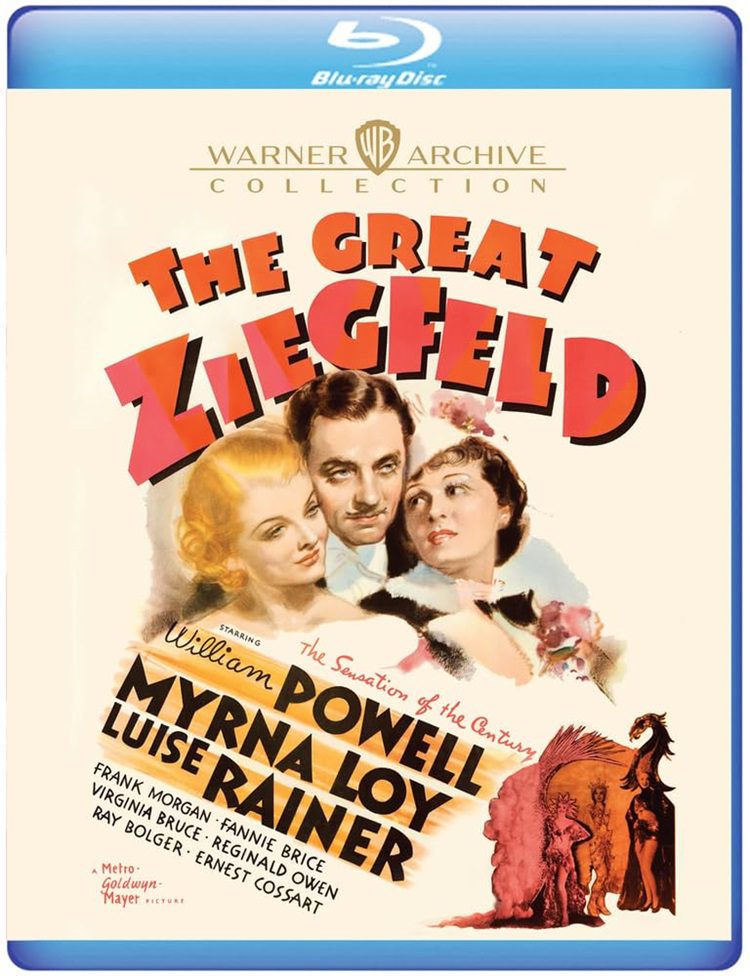
The Great Ziegfeld, winner of three Academy Awards including Best Picture, tells a story that, in quite an unusual on-screen attribution, was “suggested by romances and incidents in the life of America’s greatest showman, Florenz Ziegfeld, Jr.” The film is notable for its creation of elaborate stage performances, like those presumably seen in Ziegfeld Follies, which make up for the script’s weakness in repeatedly resolving conflicts anticlimactically.
Buy The Great Ziegfeld Blu-rayIn what appears to be the Road Show version of the film, with its inclusion of an Overture, Entr’acte, and Exit Music, Ziegfeld (William Powell) is first seen at the 1893 World’s Fair in Chicago, on the “Streets of Cairo,” as a barker trying to draw folks in to see Sandow the Strongest Man in the World. Business isn’t good, especially when compared to friendly rival Jack Billings (Frank Morgan), who brought in audiences with belly dancer Little Egypt. Once Ziegfeld gets the idea to allow the female patrons to feel as well as see Sandow’s muscles, their fortunes change.
Ziegfeld proves to be a bit of a hustler, always looking for an angle that will benefit him. He sells tickets to an event, he knows won’t pan out and skips town with the box-office receipts. He competes with Billings for French singer Anna Held (Luise Rainer in an Oscar-winning performance) and gets her to come work for him in America and gets her hand in marriage. When her first show doesn’t succeed, he has 20 gallons of milk delivered every day but doesn’t pay the bill. He informs newspapers Anna bathes in the milk to draw interest, and it works.
He puts on another show, without Anna. Ziegfeld Follies is a huge hit and the “Wedding Cake” sequence shows why as early 20th century audiences were surely wowed by the spectacle of a rotating tower with 175 spiral steps, adorned with numerous costumed dancers. The scene might play out too slowly for modern-day audiences.
Keeping the Follies the success is a constant challenge. He has to keep things fresh by bringing in new talent, such as Ray Bolger and Fanny Brice, who play themselves. He also to keep his stars happy, which proves difficult with Audrey Dane (Virginia Bruce), whose drinking complicates matters. While trying to help her, she kisses him just as Anna walks in. Anna not only walks out but they divorce, suggesting this isn’t his first involvement with a cast member, but there’s not much shown in their marriage ending, undercutting the drama. Ziegfeld then meets actress Billie Burke (Myrna Loy), marries her, and they have a child. Inspired by their young girl and her toys, his next show is a circus-themed ballet.
Although the film clocks in at over three hours, the end is rushed. A montage of newspaper headlines show Ziegfeld struggling to recoup costs because his productions aren’t connecting audiences and Hollywood is drawing talent away. After listening to fellas in a barber shop unknowingly mock his downfall and inability to create another hit, he brags that he’s going to have four hits on Broadway at the same time. With a few cuts, the marquees of four Broadway hits are shown. While his business sense proves a great success on Broadway, it fails him on Wall Street when the 1929 stock market crash bankrupts him, which leads to his death.
The video has been given 1080p/MPEG-4 AVC displayed at the original aspect ratio of 1.37:1. Created from a new 4K scan,inky blacks anchor the variety of grays. Film grain is apparent throughout as is an occasional soft focus. Audio is available in DTS-HD 2.0. Dialogue is clear but composer Walter Donaldson’s score and the songs are set at too loud of a volume in the mix. Hard to set lower than normal so as not to distort. There’s a noticeable hiss on the track.
The Special Features are:
- Premiere Newsreel (4 min) – Footage of throngs of people outside New York’s Astor Theatre at the film’s premiere, and interviews with some attending, including A Night at the Opera co-stars Kitty Carlisle and Harpo Marx.
- Ziegfeld on Film (4 min) – Actress Luise Rainer and two of Ziegfeld’s relatives (daughter Patricia Ziegfeld-Stephenson and nephew Richard Ziegfeld) talk about the man and the movie.
- Toy Town Hall (7 min) – From 1936, this Friz Freleng-directed Merrie Melodies cartoon sees a young boy’s toys come to life after he goes to bed and puts on a version of Fred Allen’s Town Hall Tonight. Some familiar faces to fans of the era.
- Leo Is on the Air radio promotional program (audio, 14 min)
- Original Theatrical Trailer
- Song Selection – Skip straight to the film’s songs
The Great Ziegfeld is a great spectacle and its easy to see why its production numbers impressed audiences in 1936. Ziegfeld is a cad, but as long as its not your money nor your heart he is playing with, William Powell’s charm and William Anthony McGuire’s hagiographic screenplay make him “great.” The Warner Archive Blu-ray delivers a satisfactory high-def presentation and some nice extras.